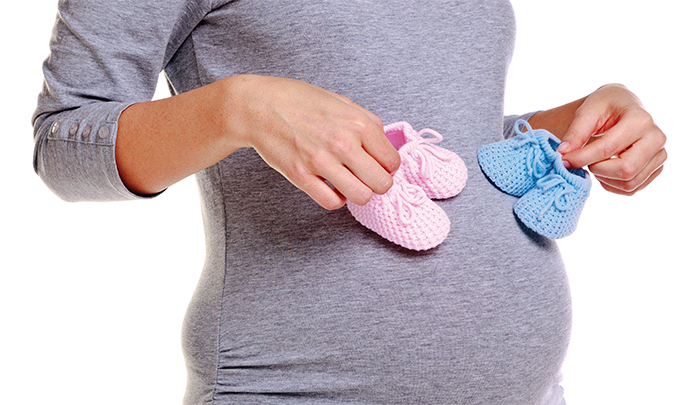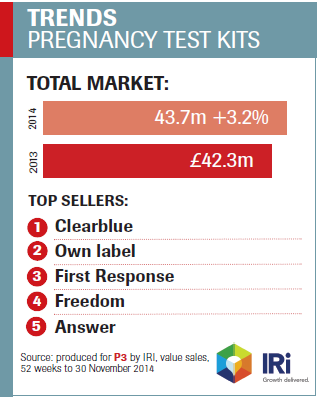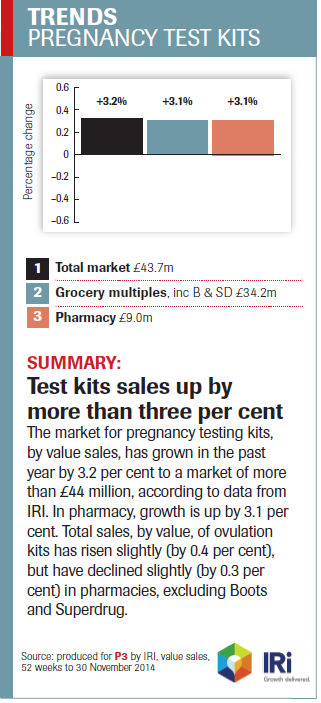Insight

Pregnancy- a growing market?
In Insight
Bookmark
Record learning outcomes
More women than ever are having children later in life, making supplements and ovulation kits the new must haves

In the last two decades more and more women are having their first child after the age of 35 – even age 40.
Birth rates in women over the age of 35 are now the fastest growing, and the numbers of mothers aged 40-plus have nearly doubled in the last decade, according to figures from the Office for National Statistics.
While this does somewhat dispel the dire warnings about later life fertility, older parents and parents-to-be are probably more likely to prepare for a pregnancy with supplements, purchase ovulation kits to help plan conception, and potentially have more issues with fertility than younger first time parents.
Pharmacies can support would-be parents of all age groups, but especially older couples, by providing a complete range of pharmacy services that caters for all stages of the journey, from pre-conception to birth and beyond.
Nicola Cox, business leader for Clearblue suggests that starting with diagnostics is essential. "We know that in the pregnancy and fertility marketplace, Pharmacists are uniquely placed to sell diagnostic products as they can provide information, advice and recommendations to consumers who are new to the category and may be looking for information.
Lack of vitamin D can cause  problems such as weak bones and even rickets
 "We believe the pharmacy channel can benefit from investing in the pregnancy category and in particular the ovulation category and that is why we are investing in the training and support for pharmacy assistants in order to help them better serve their customers.’
"We believe the pharmacy channel can benefit from investing in the pregnancy category and in particular the ovulation category and that is why we are investing in the training and support for pharmacy assistants in order to help them better serve their customers.’
Clearblue, the brand leader in home pregnancy testing for 25 years, is committed to continue to grow the fertility and ovulation testing category. Nicola adds: "Clearblue continues to be at the forefront of innovation for the pregnancy and ovulation diagnostic category, with the most advanced technology in each of the markets it plays in. We continue to listen to consumers and invest in research to ensure we are meeting their needs."
Also investing in ovulation in addition to pregnancy testing is Alvita. The most recent addition to the range is a 7-pack of Ovulation Tests, which according to Alvita are ‘simple to use, easy to read and suggest the best two days for conception.’
The Alvita range includes a selection of pregnancy and ovulation tests, including an Early Response Pregnancy Test, which can be used up to 4 days before a period is due. The range is exclusive to Alliance Healthcare.
Fathers present in the delivery room could worsen childbirth pain
An article in The Telegraph last month discussed a recent study conducted by University College London, King’s College London and the University of Hertfordshire, investigating whether or not partners helped women have a more pain-free birth. A study found the pain felt by 39 women given pinprick laser pulses on their fingers was not reduced by the presence of their partner, and that women who were the least emotionally close with their partner felt more pain. More research is needed, in real delivery situations, it was suggested.
Dr Katerina Fotopoulou, of UCL, says: ‘Overall, this study suggests that partner support
during pain may need to be tailored to individual personality traits and coping preferences.’
Prenatal vitamins
Once pregnant, the majority of mums-to-be will begin to take even more care of their health, and if not already taking pregnancy supplements, this is the time they are likely to start.
Recent research has proved that a lack of vitamin D can cause problems such as weak bones and even Rickets, and there have been calls for free vitamin D supplements to be made available to at-risk groups – pregnant women being one of them.
Andrew Thomas, founder and managing director at BetterYou, said: "Human beings spend more time indoors now that at any other point in our evolution, so it’s hardly surprising that for a vitamin which we can only get from the sun, many of us lack the levels our bodies need. We think more should be done to address deficiency early in life."
BetterYou has reformulated its pregnancy product, DLuxPregnancy Daily Vitamin D Oral Spray which provides optimum daily levels of vitamin D, along with other essential vitamins for the health of mother and baby, including folic acid and vitamins B1, B6, B12 and K.
 Each dose delivers an optimal 1,000IU (25mcg) of vitamin D3 along with the recommended 400mcg of Folic Acid and 100 per cent of the guideline daily amount of vitamins B1, B6, B12 and K.
Each dose delivers an optimal 1,000IU (25mcg) of vitamin D3 along with the recommended 400mcg of Folic Acid and 100 per cent of the guideline daily amount of vitamins B1, B6, B12 and K.
Pharmacists could helpfully recommend the spray formula to women suffering with morning sickness who might struggle to take tablets but need the extra nutrients.
Spatone believe that 2015 will be a big year, and with a report from September last year suggesting that low iron levels could be a contributor to autism, many mother-to-be will be keen to stock up on supplements that will keep their iron levels optimum during pregnancy.
Along with promising the largest above the line spend yet, the brand plans to distribute over 250,000 samples to pregnant women, while Q2 will also see new packaging for the Spatone range with a more modern design and updated on-pack messaging.
"Pharmacies can maximise their impact in the category by having a good range of products which include natural healthcare options," Nelsons suggests. "When a customer is pregnant, or trying to get pregnant, they will not only want to have the best product for them (and their baby), but are also after expert advice and knowledge. Pharmacists can play a key role in this by giving tailored advice to the customer’s needs and help educate them."
Pre-labor prep
With home birth also featuring in the news in recent months, and reports suggesting that it’s actually statistically safer to give birth at home than in hospital, products that promise to help the body prepare and recover from child birth are likely to gain in popularity. Products such as Weleda’s Perineum Massage Oil may well become very popular as mums want to do all they can to support and prepare for an easy birth at home.
First time mothers, and older mums, may be anxious about the possibility of tearing during birth or needing an episiotomy, and that fear can work against them during labour. Estimates suggest that over 85 per cent of women will have some degree of perineal tear during vaginal birth.
"Massaging the perineum with a top quality and pure oil helps relax the cellular matrix and keep the connective tissues supple and elastic - our best defence against tearing," explains Susie Fairgrieve from Weleda.
"Massage also increases the perineum’s capacity to stretch more easily and less painfully during birth. Regular perineal massage has been shown to improve the skin’s elasticity and reduce perineal trauma."
Studies examining the effects of perineal massage during pregnancy confirm that ‘timely and regular perineal massages reduce the likelihood of perineal tearing or cutting during childbirth’.
There is POS available to support the entire Weleda mother and baby range, and the brand offers training for pharmacies. There is likely to be raised brand awareness in 2015 as the Calendula Nappy Change Cream will be celebrating its 30th birthday, recently winning a Natural Pharmacy Award for Best Product for Mother & Baby.
Comment
 Shaheen Bhatia, P&S Chemist Health and Advice Centre, Ilford ‘I think it’s definitely worthwhile for pharmacies to offer in-house pregnancy testing. Nobody wants to wait for their result (a test at the GPs takes a minimum of a week to come back) so the GPs send people to us. We don’t charge and its been done by a professional. We certify the result and they then can move things on a lot more quickly. National flu vaccination targets are still not being met for pregnant women. People worry that it’s not safe, but flu is a risk to the unborn baby. Sometimes people want advice about fertility and don’t even know you can get yourself tested through their GP. If people have been using ovulation testing, for say four or five months and it’s not getting anywhere, then I suggest that they need to start considering whether they need to consult someone.
Shaheen Bhatia, P&S Chemist Health and Advice Centre, Ilford ‘I think it’s definitely worthwhile for pharmacies to offer in-house pregnancy testing. Nobody wants to wait for their result (a test at the GPs takes a minimum of a week to come back) so the GPs send people to us. We don’t charge and its been done by a professional. We certify the result and they then can move things on a lot more quickly. National flu vaccination targets are still not being met for pregnant women. People worry that it’s not safe, but flu is a risk to the unborn baby. Sometimes people want advice about fertility and don’t even know you can get yourself tested through their GP. If people have been using ovulation testing, for say four or five months and it’s not getting anywhere, then I suggest that they need to start considering whether they need to consult someone.
Â
 Bipin Patel, Broadway Pharmacy, Bexleyheath ‘I think that people are now more conscious of how they behave while they’re pregnant and are so quite receptive to health advice from the pharmacy. We will give them general advice, including all the public health messages that go out to pregnant women around smoking and alcohol, and then show an interest in their health as they are going along with the pregnancy. I think its best to give them all the messages to point them in the right direction, such as advice about folic acid, and then, based on that information, they can decide themselves.’
Bipin Patel, Broadway Pharmacy, Bexleyheath ‘I think that people are now more conscious of how they behave while they’re pregnant and are so quite receptive to health advice from the pharmacy. We will give them general advice, including all the public health messages that go out to pregnant women around smoking and alcohol, and then show an interest in their health as they are going along with the pregnancy. I think its best to give them all the messages to point them in the right direction, such as advice about folic acid, and then, based on that information, they can decide themselves.’
Â
 Reena Barai, SG Barai Pharmacy, Sutton ‘We do a lot of pregnancy tests and give advice on what to do next, and about folic acid. People hear so many conflicting things about what you should do and what you shouldn’t do when you’re pregnant. So, we get called on for the right advice and its important that we signpost people to local services. In our area we’ve got a really nice leaflet for people who’ve just found out that they are pregnant that’s been produced by our local GPs on how to access all the local services available. We keep that next to the pregnancy tests and the folic acid. One of the biggest counselling points is not to assume that people want to be pregnant or they may have had a difficult time conceiving. So there is an element of tact that needs to go into the sale of a pregnancy test. After the elderly, our second biggest group of customers are young mums. They rely on us because we’re local and give good advice and we stock the products that are relevant to them, when they need it. So it’s a group of customers we take very seriously.’
Reena Barai, SG Barai Pharmacy, Sutton ‘We do a lot of pregnancy tests and give advice on what to do next, and about folic acid. People hear so many conflicting things about what you should do and what you shouldn’t do when you’re pregnant. So, we get called on for the right advice and its important that we signpost people to local services. In our area we’ve got a really nice leaflet for people who’ve just found out that they are pregnant that’s been produced by our local GPs on how to access all the local services available. We keep that next to the pregnancy tests and the folic acid. One of the biggest counselling points is not to assume that people want to be pregnant or they may have had a difficult time conceiving. So there is an element of tact that needs to go into the sale of a pregnancy test. After the elderly, our second biggest group of customers are young mums. They rely on us because we’re local and give good advice and we stock the products that are relevant to them, when they need it. So it’s a group of customers we take very seriously.’
